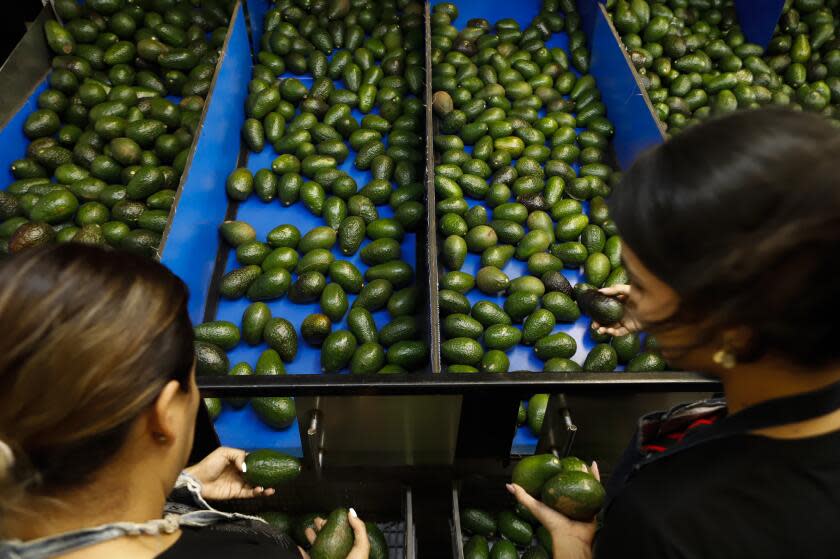Avocados toast? Price and availability could suffer after USDA halts some Mexican inspections

The flow of avocados from Mexico to California could slow in the days ahead, potentially resulting in tough times for fans of guacamole and avocado toast.
The United States Department of Agriculture said this week that it has suspended inspections of avocados and mangoes imported from the violence-plagued Mexican state of Michoacán, a move that could eventually result in higher prices for consumers.
The decision to stop inspections occurred after two United States Department of Agriculture employees were "recently attacked and detained while carrying out their work in the state of Michoacán inspecting avocados," U.S. Ambassador Ken Salazar said in a statement. The employees are no longer in captivity, Salazar said, though he did not specify how they had been freed.
It is not clear when inspections will resume. The USDA wrote in a statement to The Times on Tuesday that "the programs will remain paused until the security situation is reviewed, and protocols and safeguards are in place for [Animal & Plant Health Inspection Service] personnel."
Read more: The Times podcast: How violence taints Mexican avocados
The move will not affect avocados and mangoes that are already on their way to the United States. Fruits and vegetables from other Mexican states are also not affected by the suspension, Salazar said.
While the United States has not provided many details about the nature of the incident, Michoacán Gov. Alfredo Ramirez Bedolla told Mexico’s Radio Formula that the incident began on Friday when a vehicle carrying two inspectors — along with other vehicular traffic — was stopped during a protest in the town of Paracho. The two inspectors were never in danger or detained and were soon on their way, the governor said.
“It wasn’t a criminal act directed at the inspectors,” the governor said. Demonstrators in Mexico routinely block roadways as protests against government, organized crime or other entities. The governor expressed confidence that inspections would resume shortly. Michoacán produces more avocados than any other Mexican state.
“My government is offering all the security help needed to the inspectors,” the governor told Radio Formula.
This isn't the first time U.S. safety inspectors have faced issues in Michoacán, where the multibillion-dollar avocado industry has become a prime target for cartels, which levy heavy taxes on producers and plant their own groves of what locals call "green gold."
More than a dozen criminal groups in Mexico are battling for control of the avocado trade, preying on wealthy orchard owners, the laborers who pick the fruit and the drivers who truck it north to the United States. Parts of Michoacán now resemble an actual war zone, with gangs boasting powerful arsenals that include grenade launchers, drones rigged with explosives and tank-like vehicles known as “monsters” that are equipped with machine gun turrets and steel armor.
American inspectors have frequently found themselves caught in the middle. Two years ago, the U.S. suspended avocado imports from Michoacán after a plant safety inspector was threatened. That suspension was lifted less than a week later. In December 2020, the U.S. stopped importing avocados from one region in Michoacán for a month after an armed group burned avocado shipments, Mexican officials said.
Read more: Avocado imports from Mexico are blocked. What does that mean for you?
Salazar said he plans to travel next week to Michoacán to meet with Ramírez and the Assn. of Producers and Export Packers of Mexico to address security.
Mexican President Andrés Manuel López Obrador said on Tuesday that his government was working with the Americans to resume inspections.
“Fortunately we have good relationships and we are convincing them to act differently, but it takes time," he said.
Avocados have become a staple in the diet of many Americans who slather the creamy fruit on toast and smash it up into guacamole. Consumers have largely benefited — in their recipes and pocketbooks — from the crop's efficient production in Mexico, experts say.
In 2023, the United States imported a record 2.78 billion pounds of fresh avocados with 89% of the volume coming from Mexico. California growers, which largely specialize in Hass avocados, produce the majority of the U.S.-grown fruit, making up about 10% of the nation's consumption.
The California Avocado Commission estimates that California producers grew 233.1 million pounds of avocados during the 2022-23 season. Officials anticipate that 208 million pounds will be produced this season, making it the smallest crop since 2008, according to a USDA outlook report published in March.
Fresh avocado imports totaled nearly $3 billion last year, ranking second in U.S. fresh produce import value behind tomatoes.
The effect on consumers will depend on how long the inspections remain stalled, said Daniel Sumner, a professor of agriculture economics at UC Davis.
"If it goes away quickly it could be a little blip in the market," he said. "If it lasts several weeks, we will likely see many fewer avocados."
If the pause on inspections continue, Sumner said, people should be prepared for avocado prices to eventually rise. Stores and restaurants may choose to stop purchasing the fruit as well depending on the desires of their customer base, he said.
"That's the sort of natural thing to happen. Things get rationed by price," Sumner said.
This story originally appeared in Los Angeles Times.


